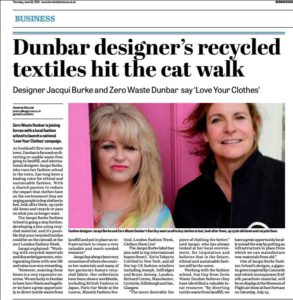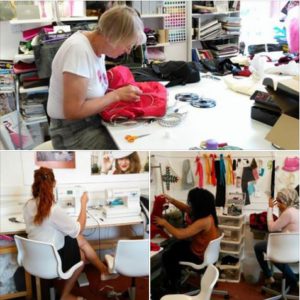 DUNBAR LEADS THE WAY IN HI-FASHION WITH ZERO WASTE
DUNBAR LEADS THE WAY IN HI-FASHION WITH ZERO WASTE
Fact fashion
In the UK, garments have an estimated life span of just two years and three months. Data from Zero Waste Scotland reveals that the average Scottish household owns around £4,000 worth of clothes, but wears only 70% of that each year – most commonly because it no longer fits. It is estimated that £140m -350,000 tonnes – of used clothes end up in landfill each year.
The East Lothian seaside town of Dunbar is renowned as an area of natural beauty, with its beautiful coast and stunning countryside. It is the birthplace and home to many inspirational people – John Muir, General Sir Reginald Wingate, Robert Wilson, Jacqui Burke and is Scotland’s very first Zero Waste Town. The latter two are working together on an exciting new national campaign Love Your Clothes, which aims to help reduce the impact that clothes have on the environment, but they want to take it one step further...
International designer and naturalist Jacqui Burke, has been a leading voice for ethical and sustainable fashion design for many years. In addition to being founder of the Jacqui Burke Fashion School, Jacqui’s collections have been shown worldwide and the Jacqui Burke label sold to all the top UK fashion retailers include Joseph, Selfridges and Bruce Jeremy, London, Richard Creme, Manchester, Corniche, Edinburgh and Sax, Glasgow. Jacqui has always been very conscious of where she sources her fabric and many of her garments feature recycled fabric.
Dunbar is Scotland’s very first Zero Waste town and works with the community to reduce waste to landfill and maximise the benefits of re-use and recycling. They focus on encouraging people to think about the way they purchase, use and dispose of their waste and by working with the Fashion School they have identified a valuable local resource, the culmination of which will appear at the 2017 London Fashion Week.
‘The design of clothing is as important as the ethos behind it. The more desirable the piece of clothing the better, says Jacqui, who has always looked at her local environment, for inspiration and believes that in the future, ethical and sustainable fashion will be the norm in the fashion world.’
The Love Your Clothes campaign aims to help reduce the impact that clothes have on the environment through a call to buy clothes to last, look after them, up cycle old items and recycle or pass on what you no longer want to keep.
Jacqui went on to comment. ‘Working with recycled materials and discarded garments, reinvigorating them with new life and value is so very rewarding.’ However, sourcing these items is a very expensive exercise. We are lucky in Dunbar to have Zero Waste and together we have a great opportunity to divert textile waste from landfill and put in place an infrastructure to reuse a very valuable and much needed resource.’
Sue Guy of Zero Waste Dunbar commented ‘by diverting textile waste from landfill, we have a great opportunity locally to lead the way by putting an infrastructure in place from which we can manufacture new materials from old.’
 Just to prove this can be done. You can view one of Jacqui Burkes Fashion School, exciting and innovating new designs at the Museum of Flights, air show on 23 July. ‘The supersonic Concorde captured the imagination of aviation fans around the world and has retained a dedicated following since it was retired from service in 2003. Jacqui’s unique design incorporates the use of original silk parachutes donated from RAF News reader Brian Pickard, together with other flights of imagination.
Just to prove this can be done. You can view one of Jacqui Burkes Fashion School, exciting and innovating new designs at the Museum of Flights, air show on 23 July. ‘The supersonic Concorde captured the imagination of aviation fans around the world and has retained a dedicated following since it was retired from service in 2003. Jacqui’s unique design incorporates the use of original silk parachutes donated from RAF News reader Brian Pickard, together with other flights of imagination.
The area of recycling and upcycling is a rich and growing source of innovative design in the fashion and accessories industries. In a world still churning out trendy throw-away fashion pieces at breakneck speed, the idea of upcycled or refashioned apparel can be an anomaly. But it is a continuously growing trend and is one of the most sustainable things people can do in fashion. As upcycling makes use of already existing pieces, it often uses few resources in its creation and actually keeps ‘unwanted’ items out of the waste stream.’